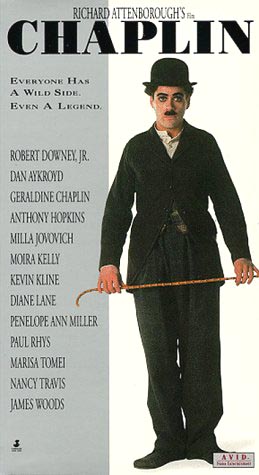Robert Downey Jr. shines in the biopic on the life of Charlie Chaplin and his Tramp.
 A lot of generic biopics about geniuses get a pass because they show an endearing side to a beloved figure. I can swallow a mediocre movie about “The Doors” because Val Kilmer is so electric as Jim Morrison on stage and I love the music.
A lot of generic biopics about geniuses get a pass because they show an endearing side to a beloved figure. I can swallow a mediocre movie about “The Doors” because Val Kilmer is so electric as Jim Morrison on stage and I love the music.
In the case of “Chaplin,” I’m at a crossroads. I adore Charlie Chaplin and The Tramp, and Robert Downey Jr. has his mannerisms and his likeness down pat. It’s a wonderful performance, and the same goes for Kevin Kline as Douglas Fairbanks, a natural fit. But Richard Attenborough’s film has the markings of a prestige picture, a stuffy melodrama made to win Oscars and exactly the opposite of what The Tramp stood for. It doesn’t understand what made Chaplin such a gifted physical comedian or have the visual style to capture how his knack behind the camera gave each visual gag the necessary grace and style to make it funny, and it doesn’t show how he came to be truly great but rather assumes he always was.
I refer back to the most basic rules of movie biopics about geniuses: focus on an individual moment of the figure’s story, not their entire life. Drawn from Chaplin’s real-life autobiography and yet reimagined as Chaplin filling in important blanks of his life story with a fictional publisher (Anthony Hopkins), Attenborough’s film starts in Chaplin’s childhood and his complications with a mentally ill mother, then moves through his early vaudeville days before he’s swept off to America and early Hollywood. During the title cards, the black and white image of a sad, lonely Tramp removing his makeup has an unexpected poignancy, a quick glimpse of an icon as we’ve never seen him before, but Attenborough immediately signals what kind of melodramatic slog this will be. Why do we have to endure such bland, downtrodden moments of grief when we’re telling a story of one of the silver screen’s most beloved clowns?
“Chaplin” gets caught in an unfortunate middle ground, with film buffs who already know the full story disappointed at how the film chooses to treat their icon, and with newbies to Chaplin getting the wrong idea about his legacy. And while it might’ve been a wise idea to update the Tramp persona to exist in the late 20th Century, the movie forgoes a sense of classicism and feels dated as a result.
Occasionally the film shows twinkles of magic. Chaplin gets giddy and awestruck at the early magic of cinema and in how pioneer director Mack Sennett (Dan Aykroyd) walks him through the elementary simple process of movie editing in order to create something incredible. It feels quaint today, but then this was once considered a gimmick and a novelty. Another sequence with Chaplin dodging some real life cops toys with some original slapstick and zaniness, although without a classical bent, several of these Downey showcases are undercut by editing that, in Chaplin’s case, would’ve been far more economical.
Working from “The Immigrant” up through “Limelight” and through all of his tumultuous marriages and tabloid worthy affairs, everything here has moments of promise before becoming yet another footnote in his autobiography. When your only goal is to do lip service to everything and say that even the genius can feel humble and inadequate, it begs the question again, who is this movie for? What is it trying to say? The Tramp never spoke a word, and yet he spoke more volumes than the biopic bearing his name.
 The thing about Bill Murray movies is, they often don’t work without him. “Groundhog Day” would be a horrible Adam Sandler comedy if anyone but him played the part, and the same is true of “Ghostbusters.” Aside from all the ugly misogyny that’s being thrown at the movie sight unseen, no wonder everyone is freaking out over a remake of “Ghostbusters.”
The thing about Bill Murray movies is, they often don’t work without him. “Groundhog Day” would be a horrible Adam Sandler comedy if anyone but him played the part, and the same is true of “Ghostbusters.” Aside from all the ugly misogyny that’s being thrown at the movie sight unseen, no wonder everyone is freaking out over a remake of “Ghostbusters.”
 A lot of generic biopics about geniuses get a pass because they show an endearing side to a beloved figure. I can swallow a mediocre movie about “The Doors” because Val Kilmer is so electric as Jim Morrison on stage and I love the music.
A lot of generic biopics about geniuses get a pass because they show an endearing side to a beloved figure. I can swallow a mediocre movie about “The Doors” because Val Kilmer is so electric as Jim Morrison on stage and I love the music.